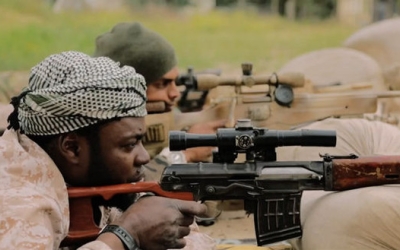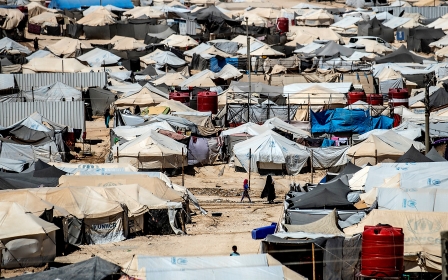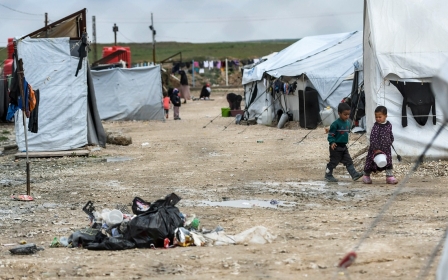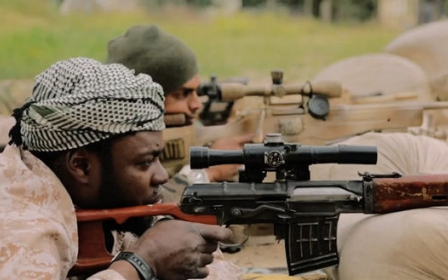REVEALED: Nearly 100 Trinidadians held at Al-Hol camp in northern Syria
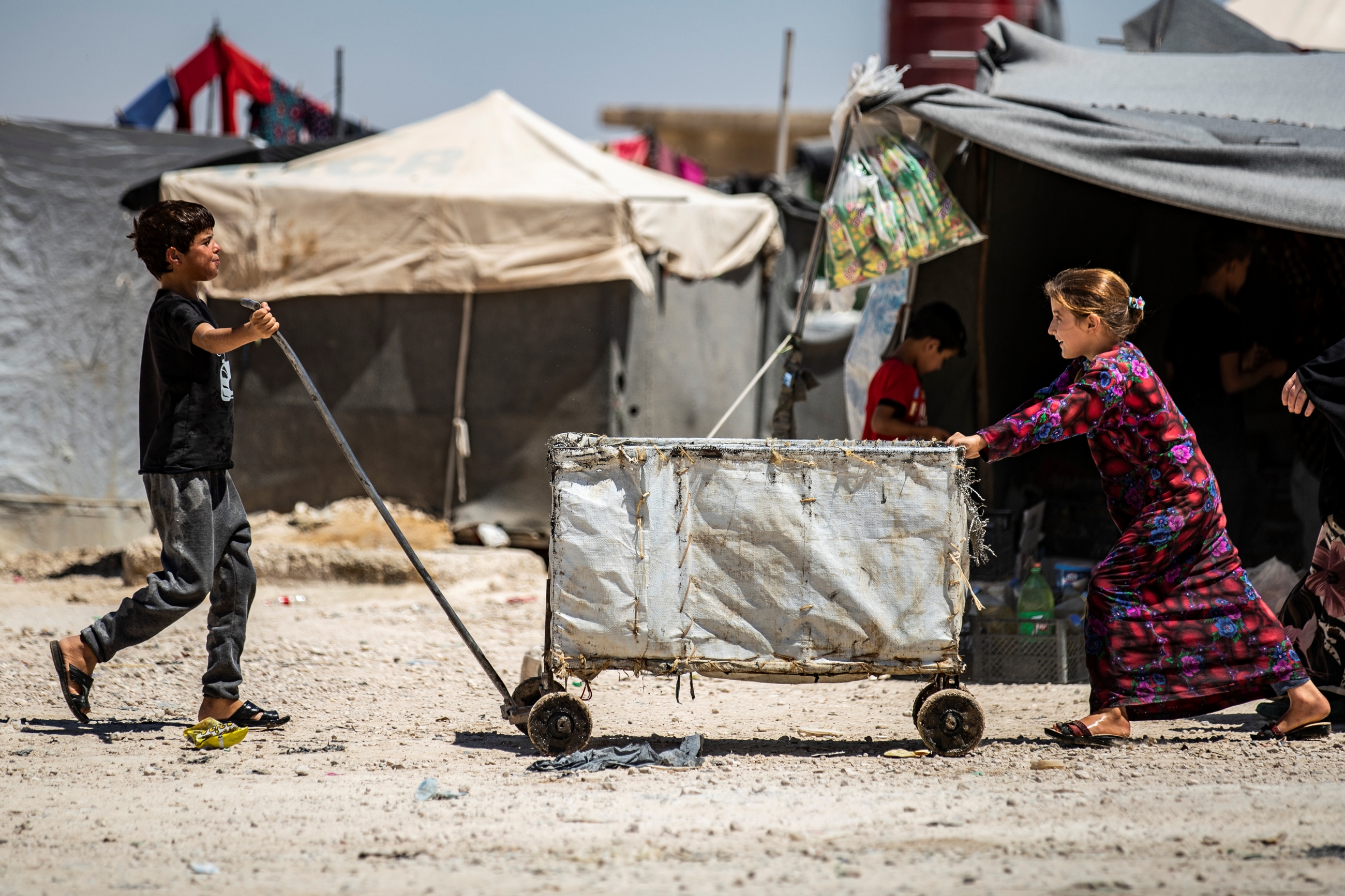
Trinidad and Tobago has almost 100 nationals stuck at the dangerously overcrowded Al-Hol camp in northern Syria, Middle East Eye can disclose, a number that includes over 70 children.
The revelation comes as a group of Trinidadian children made a heartfelt plea to return home from the camp in audio messages obtained by MEE, in which they also claim to have contracted a potentially life-threatening disease.
The developments are set to add pressure on the Caribbean government to speed up the repatriation process at a time when some countries have become more open to quickly evacuating their nationals as the security situation in the region deteriorates.
Trinidad-based families have been lobbying the government for months, in an effort led by Felicia Perkins-Ferreira, who rescued her two children from the neighbouring Al-Roj camp in January.
A detailed list compiled by the families and shared with MEE offers an insight into the Trinidadian nationals held at Al-Hol, who arrived as part of an exodus of people fleeing the capturing of Islamic State group territory by a US-backed military campaign spearheaded by the Syrian Democratic Forces (SDF) earlier this year.
Some 25 women and 71 child nationals of Trinidad and Tobago were at the camp as of the start of November, according to the documents.
Previous reports put the total number at 25.
Despite having a population of just 1.4 million, the country is thought to have contributed the highest number per capita of travellers to territories held by the Islamic State group.
At least 130 Trinidad and Tobagonian nationals went to Iraq and Syria between 2013 and 2016.
This was largely a family affair, the documents show.
Some extended families have up to nine members are at the camp, while within some family groups there are members spanning three generations.
The documents show that a 55-year-old woman became a grandmother in Syria after her daughter gave birth to a baby girl three months ago.
In total, 19 of the children held at the camp were born in Syria.
According to the documents, 22 other children are held in Iraq, where a Trinidadian woman was sentenced to death in 2018 for her involvement in IS.
'My belly is hurting. I got chicken pox'
Home to 70,000 people mostly living in makeshift tents, conditions at Al-Hol are notoriously harsh.
Outbreaks of violence between inmates and Kurdish guards are routine.
Pictures of Trinidadian children obtained by MEE last month showed a boy with open, festering flesh on his scalp. Flies gathered at the mouth of his younger brother in another photo.
These children, Naseer and Suhail and their sister Jehann, have spoken of their ordeal in audio messages in English addressed to their grandmother who is based in Trinidad.
In one message eight-year-old Naseer can be heard coughing heavily and saying he has contracted chicken pox.
“Hi Granny, my name is Naseer. I love you. How you going? I miss you. I’m feeling sick. I want to hug you.”
“My belly is hurting. I got chicken pox,” he continued, before ending the message with “bye bye”.
With one of the children born in Syria, it is unclear to what extent they have been immunised against the effects of the disease, which in some cases can lead to death.
Six-year-old Jehann begins another message with the Islamic greeting “Assalamu ‘alaikum”.
“Granny how you going? I miss you. This is Jehann. When we coming home I don’t know. I want to come. I want to see you. I miss you. Bye bye," she says.
Despite their unkempt appearance, the three children are able to muster hopeful smiles as they sit huddled together in a tent, in footage seen by MEE.
Jehann and Naseer had travelled to Syria with their mother, Amadi Alimayu, who is with them at Al-Hol, and their father, who has since died in the fighting. Suhail, four, was born in Syria.
No time to waste
After years of reluctance, Western countries have gradually come around to taking back nationals held in Syria. Germany began repatriating children earlier this year, while Britain is working to bring back children born to suspected IS militants. Belgium vowed to evacuate IS suspects last month.
The change in policy has been prompted by a worsening security situation amid fighting between Turkey and the Kurdish-led SDF last month, during which Ain Issa, another camp for displaced persons, was struck.
Turkish President Recep Tayyip Erdogan has also begun to make good on an earlier promise to deport IS suspects held in Turkish prisons, deporting a British man and six Germans on Thursday and preparing to deport an American.
Authorities in Trinidad and Tobago have permitted a handful of nationals to return, but families say they now need to act faster.
'They don’t even know where they are or how they got there. It’s a bad place. I’m appealing to the government to speed things up'
-Yacina Alimayu
The minister of national security said last month that the authorities had yet to establish whether those at the camp were in fact nationals.
"We have a responsibility to verify claims before acting and the public’s interest is priority in exercising the associated duties."
The government did not respond to the questions sent to them.
Yacina Alimayu, the aunt of the three children, urged the government to act fast to bring the children home.
“They don’t even know where they are or how they got there. It’s a bad place," she said. "I’m appealing to the government to speed things up. He wants to see his grandmother again. Grant him that wish.”
Middle East Eye propose une couverture et une analyse indépendantes et incomparables du Moyen-Orient, de l’Afrique du Nord et d’autres régions du monde. Pour en savoir plus sur la reprise de ce contenu et les frais qui s’appliquent, veuillez remplir ce formulaire [en anglais]. Pour en savoir plus sur MEE, cliquez ici [en anglais].


